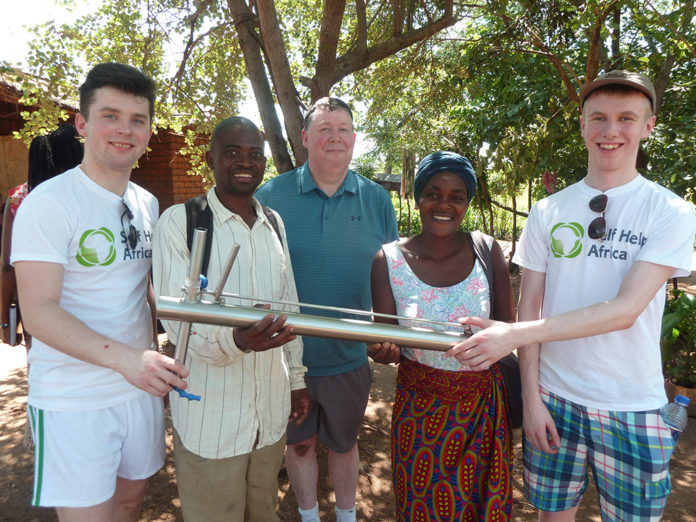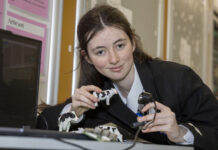
Two teenagers from Limerick got the chance to investigate how their science project might have a positive impact on the lives of people in rural Africa, during a study visit to Malawi this month.
Winners of the Irish Aid sponsored ‘Science for Development Award’ at the event, former students of Desmond College, Newcastlewest Jack O’Connor (18) and Diarmuid Curtin (18), together with their teacher Donal Enright travelled to Malawi with a group of 20 Irish secondary students and teachers, on the annual schools trip organised by the Development Education arm of charity Gorta-Self Help Africa. As the winners of one of the top prizes at last year’s BT Young Scientist and Technology Exhibition.
Travelling to Lilongwe, the capital city of Malawi, and on to the Balaka district in the southern part of the sub-Saharan country, the trio was able to present their award-winning project – a hand-held seed planter – to rural farming communities, university students as well as the Irish ambassador to Malawi, Limerick-born Gerry Cunningham. The ambassador took a keen interest in the seed planter invented and patented by the students.
“This visit to Malawi is an excellent opportunity for Diarmuid and Jack to field test their device and see if it could potentially support farmers in their work,” he said.
The students’ metal planter – designed to save time, labour, and bring precision to seed planting – was well received in the farming communities visited.
“We were a bit anxious as to how farmers would react to our device, as it is a cultural shift comparing to their traditional methods of planting seeds. We were surprised to see how accepting they were and were delighted to get their opinions,” explained Diarmuid Curtin.
“One of the most practical things that we heard was that the metal used wouldn’t be locally available or affordable, and that bamboo or plastic would be more easy for them to work with, It would make the device cheaper and easier for them to maintain”, added Jack O’Connor.
On the final day of their week-long visit the Limerick students presented their invention to students at one of Malawi’s biggest farm training colleges, the Lilongwe University of Agriculture and Natural Resources.
“The group really showed us what we could achieve with the planter.” explained Jack O’Connor.
The aim of the trip was to give the students a chance to see Africa, and learn more about the challenges that people face in their daily lives, explained Dorothy Jacob, coordinator of Gorta-Self Help Africa’s Development Education programme.
“I was amazed by how innovative farmers are in Malawi. We visited groups that grafted fruit trees, others that were using intercropping to restore the soil. Trade also is developing; farmers are shifting from just feeding themselves to selling a surplus of crops,” Jack O’Connor said.
The end of the trip was just a beginning for the two students who are planning to work on a new model for the planter, drawing from their experience in Malawi. Eventually, the pair has the ambition to see the device used in the field in the next few years. “We made great contacts through the Irish Embassy, the university and Gorta-Self Help Africa staff. Once we get back to Ireland, we’ll get the conversation going and see where it takes us!” Jack O’Connor concluded.
More about education here.









